1992 VOLKSWAGEN TRANSPORTER temperature
[x] Cancel search: temperaturePage 85 of 164

Downloaded from www.Manualslib.com manuals search engine
DRIVING
TIPS
• Where possible make
full
use of the maximum permissible drawbar weight on
call
of the towing bracket - see page 151 -
cut do not exceed it.
• While observing the permissible trailer
and
drawbar weight, distribute the load in
the trailer so
that
heavy objects are as near
as
possible to the axle. The objects must
a
so be secured so
that
they cannot slip
aoout.
• Check the
tyre
pressures on the towing
/ehicle
and the trailer.
• The headlight settings, should be
:hecked
with
trailer attached before mov- ng off and adjusted as necessary.
On
vehicles
with
headlight beam control it
is
only necessary to
turn
the knurled disc in
:ash
in the appropriate direction.
Driving
instructions
To
obtain the best possible handling of ve
hicle
and trailer, the following should be
noted:
• Try to avoid driving
with
an unladen ve
hicle
and a loaded trailer. If this cannot be
avoided,
only drive slowly to allow for the unfavourable weight distribution.
• As driving stability of vehicle and trailer
decreases
when the speed increases do not
drive at the maximum permissible top
speed
in unfavourable road, weather or
wind conditions - particularly when going downhill. In any
case
the speed must be reduced im
mediately the trailer shows the slightest
sign
of snaking. On no account try to stop
the snaking by accelerating.
• For safety reasons one should not drive faster than 80 km/h (50 mph). This also
applies
in countries where higher speeds
are permitted. • Always brake in good time. If the trailer
has
an overrun brake, apply the brakes gen
tly at
first
then firmly. This will avoid the
jerk
ing caused by the trailer wheels locking.
Change
down before going down a steep hill so
that
the engine can act as a brake.
• When a long climb in a low gear
with
ex tremely high engine revs must be nego
tiated at exceptionally high ambient temperatures the coolant temperature gauge must be observed. When the gauge needle
moves
to the
>~zza'
e~z of :ne
scale,
the road speed must be reduced immediately. If nevertheless ~g amp flashes,
stop immediately and si ow the engine to
cool
off at idling speed for several minutes.
• The cooling effect of the radiator fan
can
not be increased by changing down, be
cause
the speec of t~e
~a~
s ~o! dependent
on the engine
speed.
One should therefore not change down even when towing a
trailer as long as :-e e-g -e zar cope with out the vehicle speed dropping too much.
83
www.vwT4camper.info - a useful website for owners and enthusiasts of VW T4 Transporter Campervans
Page 88 of 164
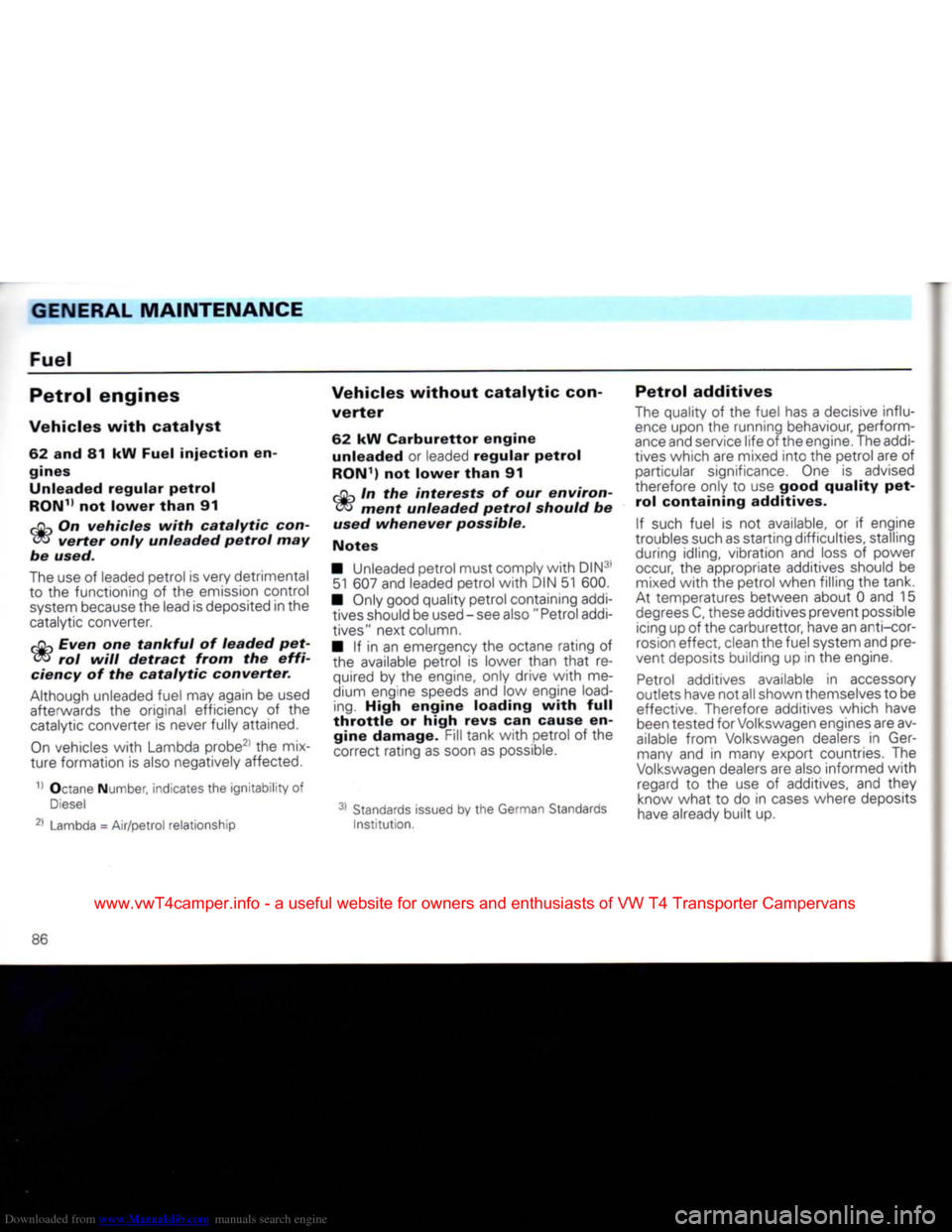
Downloaded from www.Manualslib.com manuals search engine
GENERAL
MAINTENANCE
Fuel
Petrol
engines
Vehicles
with
catalyst
62 and 81 kW Fuel
injection
en
gines
Unleaded
regular
petrol
RON11 not
lower
than
91
rQp
On
vehicles
with
catalytic
con-
<35
verter
only
unleaded
petrol
may
be
used.
The
use of leaded petrol is very detrimental
to the functioning of the emission control
system
because the lead is deposited in the
catalytic converter.
rijK
Even
one
tankful
of
leaded
pet-
®5
rol
will
detract
from
the
effi
ciency
of the
catalytic
converter.
Although unleaded fuel may again be used
afterwards the original efficiency of the
catalytic converter is never fully attained.
On
vehicles
with
Lambda probe2' the mix
ture formation is also negatively affected.
11
Octane
Number, indicates the ignitability of
Diesel
2) Lambda = Air/petrol relationship Vehicles
without
catalytic
con
verter
62 kW
Carburettor
engine
unleaded
or leaded
regular
petrol
RON1) not
lower
than
91
i-Op
In the
interests
of our
environ-
ment
unleaded
petrol
should
be
used
whenever
possible.
Notes
• Unleaded petrol must comply
with
DIN3' 51 607 and leaded petrol
with
DIN 51 600.
• Only good quality petrol containing addi tives should be used - see also" Petrol addi
tives"
next column.
• If in an emergency the octane rating of the available petrol is lower than
that
required by the engine, only drive
with
me
dium engine speeds and low engine load
ing.
High
engine
loading
with
full
throttle
or
high
revs
can cause en
gine
damage.
Fill tank
with
petrol of the
correct rating as soon as possible.
31 Standards issued by the German Standards Institution.
Petrol
additives
The
quality of the fuel has a decisive influ
ence
upon the running behaviour, perform
ance
and service life of the engine. The addi
tives which are mixed into the petrol are of particular significance. One is advised
therefore only to use good
quality
pet
rol
containing
additives.
If such fuel is not available, or if engine
troubles such as starting difficulties, stalling during idling, vibration and loss of power
occur,
the appropriate additives should be
mixed
with
the petrol when filling the tank.
At temperatures between about 0 and 15
degrees
C, these additives prevent possible icing up of the carburettor, have an anti-cor
rosion effect, clean the fuel system and pre
vent deposits building up in the engine.
Petrol
additives available in accessory
outlets have not all shown themselves to be
effective. Therefore additives which have
been
tested for
Volkswagen
engines are av
ailable
from Volkswagen dealers in
Ger
many and in many export countries. The
Volkswagen
dealers are also informed
with
regard to the use of additives, and they know what to do in
cases
where deposits
have
already built up.
SB
www.vwT4camper.info - a useful website for owners and enthusiasts of VW T4 Transporter Campervans
Page 89 of 164
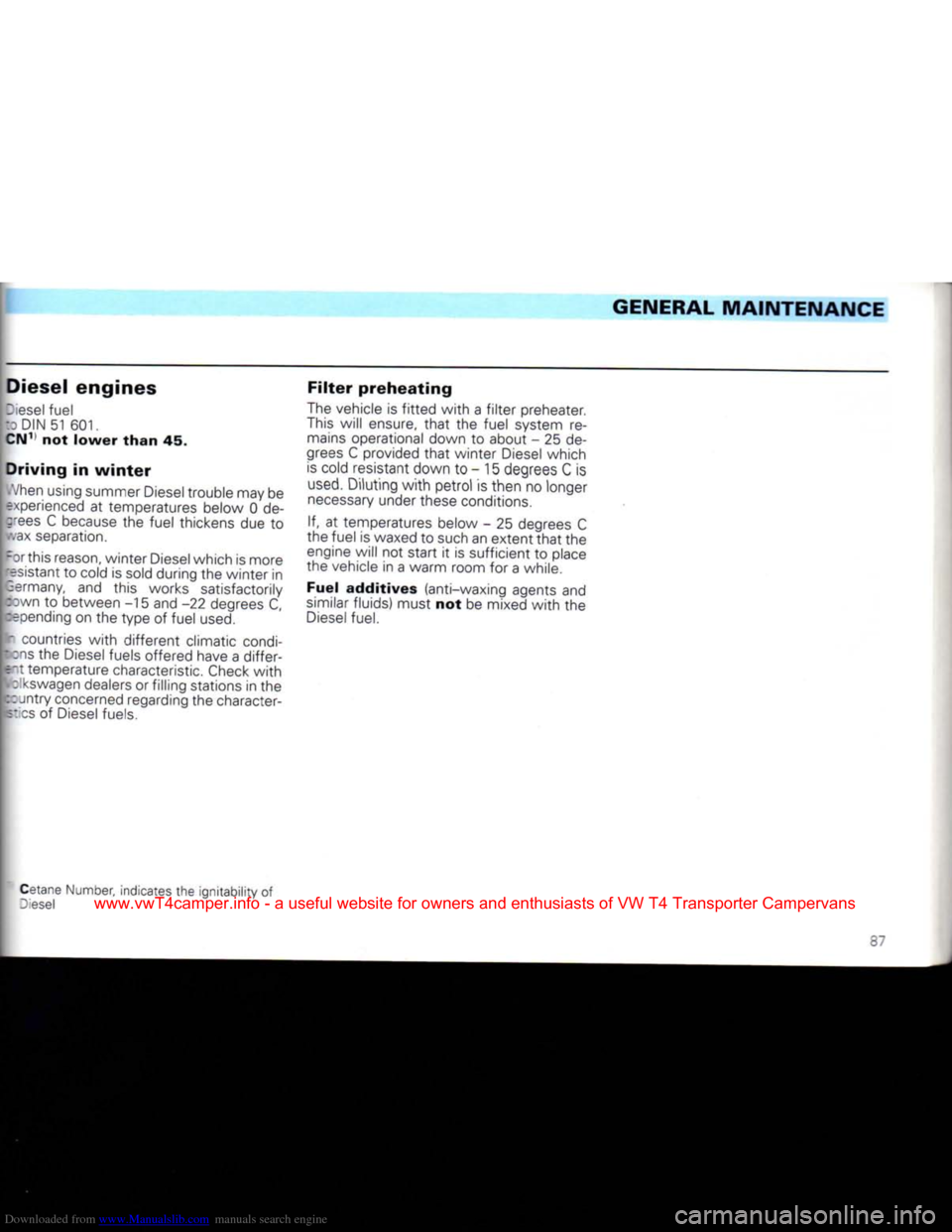
Downloaded from www.Manualslib.com manuals search engine
GENERAL
MAINTENANCE
Diesel engines
Diesel
fuel
I
DIN 51 601.
CN1'
not
lower
than
45.
Driving
in
winter
When
using summer Diesel trouble may be
experienced
at temperatures below 0 de
grees
C because the fuel thickens due to
wax
separation.
Br
this
reason,
winter
Diesel
which is more
"esistant
to cold is sold during the winter in
Germany,
and this works satisfactorily
:Dwn
to between -15 and -22 degrees C,
cepending
on the type of fuel
used.
I countries with different climatic condi-
" :ns the Diesel fuels offered have a differ
ent
temperature characteristic.
Check
with ; kswagen dealers or filling stations in the
::
jntry
concerned regarding the character-
s:
cs of Diesel fuels.
Filter
preheating
The
vehicle is
fitted
with a filter preheater.
This
will ensure, that the fuel system re
mains
operational down to about - 25 de
grees
C provided that winter Diesel which
is
cold resistant down to - 15
degrees
C is
used.
Diluting with petrol is then no longer
necessary
under these conditions.
If, at temperatures below - 25 degrees C
the fuel is waxed to such an extent that the
engine
will not start it is sufficient to place
the vehicle in a warm room for a while.
Fuel
additives
(anti-waxing agents and
similar
fluids) must not be mixed with the
Diesel
fuel.
Cetane
Number, indicates the ignitability of
Diesel
www.vwT4camper.info - a useful website for owners and enthusiasts of VW T4 Transporter Campervans
Page 90 of 164
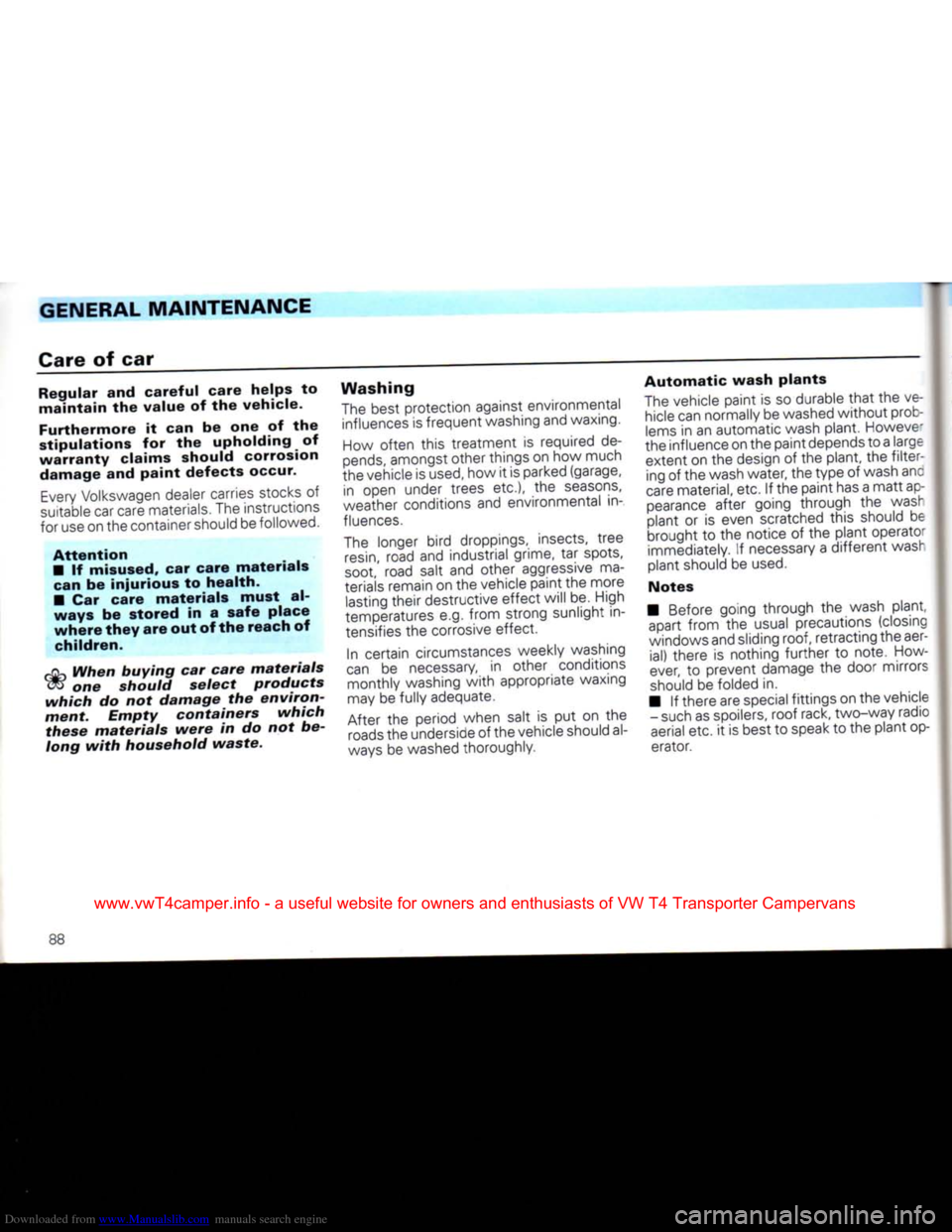
Downloaded from www.Manualslib.com manuals search engine
GENERAL
MAINTENANCE
Care
of car
Regular
and
careful
care
helps
to
maintain
the
value
of the
vehicle.
Furthermore
it can be one of the
stipulations
for the
upholding
of
warranty
claims should corrosion
damage
and
paint
defects
occur.
Every
Volkswagen dealer carries stocks
of
suitable car care materials. The instructions
for use on the container should be followed.
Attention
•
If
misused,
car
care
materials
can
be
injurious
to
health.
•
Car
care
materials
must
al
ways
be
stored
in a
safe
place
where
they
are out of the
reach
of
children.
When
buying
car
care
materials
one
should
select
products
which
do not
damage
the
environ
ment.
Empty
containers
which
these
materials
were in do not be
long
with
household
waste.
Washing
The
best protection against environmental
influences
is frequent washing and waxing.
How
often this treatment
is
required
de
pends,
amongst other things on
how
much
the vehicle is
used,
how
it
is parked (garage, in open under trees etc.),
the
seasons,
weather conditions
and
environmental
in
fluences.
The
longer bird droppings, insects, tree
resin,
road
and
industrial grime,
tar
spots,
soot, road salt
and
other aggressive
ma
terials remain on
the
vehicle paint the more lasting their destructive effect will be. High
temperatures e.g. from strong sunlight
in
tensifies
the
corrosive effect.
In certain circumstances weekly washing
can
be
necessary,
in
other conditions monthly washing
with
appropriate waxing
may
be
fully adequate.
After
the
period when salt
is put on the
roads
the underside
of
the vehicle should al
ways
be
washed thoroughly.
Automatic
wash
plants
The
vehicle paint
is so
durable
that
the ve
hicle
can normally be washed without prob
lems
in an
automatic wash plant. Howeve'
the influence on the paint depends
to
a large extent
on the
design
of the
plant,
the
filter
ing
of
the wash water, the type
of
wash anc
care
material, etc.
If
the paint has a
matt
ap
pearance
after going through
the
wash
plant
or is
even scratched this should
be
brought
to the
notice
of the
plant operate
immediately.
If
necessary
a
different wash
plant should
be
used.
Notes
• Before going through
the
wash plant, apart from
the
usual precautions (closing
windows and sliding roof, retracting the aerial) there
is
nothing further
to
note. How
ever,
to
prevent damage
the
door mirrors
should
be
folded
in.
•
If
there are special
fittings
on the vehicle - such as spoilers, roof rack, two-way radio
aerial
etc.
it is
best
to
speak
to the
plant operator.
88
www.vwT4camper.info - a useful website for owners and enthusiasts of VW T4 Transporter Campervans
Page 91 of 164
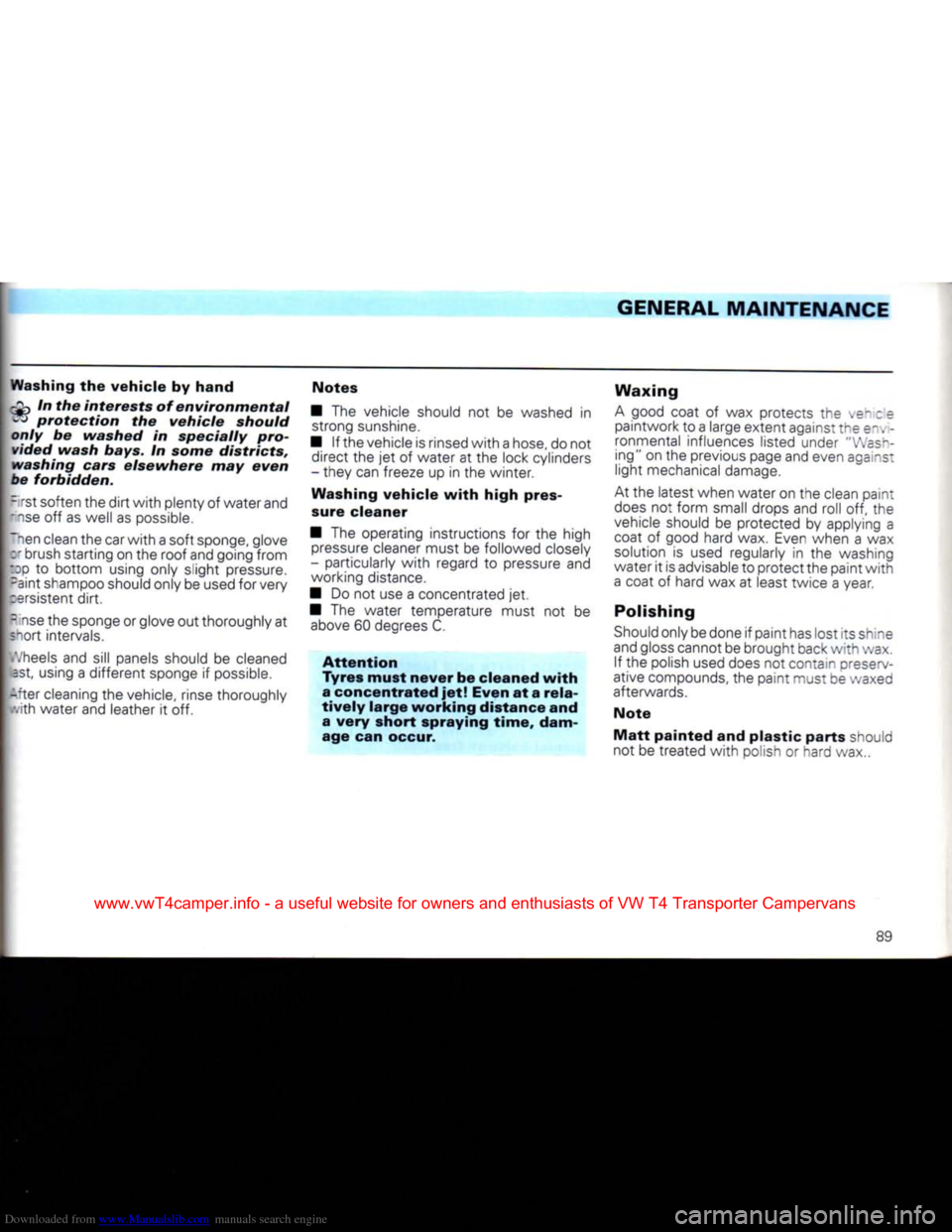
Downloaded from www.Manualslib.com manuals search engine
GENERAL
MAINTENANCE
Washing
the
vehicle
by
hand
In the
interests
of
environmental
B
protection
the
vehicle
should
only
be
washed
in
specially
pro
vided
wash
bays.
In
some
districts,
washing
cars
elsewhere
may
even
be
forbidden.
Irst
soften the
dirt
with
plenty of water and
-ise
off as well as possible.
~nen clean the car
with
a soft sponge, glove
or brush starting on the roof and going from :3p to bottom using only slight pressure. :aint shampoo should only be used for very
cersistent
dirt.
=
:nse
the sponge or glove out thoroughly at
snort intervals.
.'.'heels
and sill panels should be cleaned
last, using a different sponge if possible.
After cleaning the vehicle, rinse thoroughly
vith
water and leather it off.
Notes
• The vehicle should not be washed in strong sunshine.
• If the vehicle is rinsed
with
a
hose,
do not direct the jet of water at the lock cylinders
- they can freeze up in the winter.
Washing
vehicle
with
high
pres
sure
cleaner
• The operating instructions for the high
pressure
cleaner must be followed closely
- particularly
with
regard to pressure and working distance.
• Do not use a concentrated jet. • The water temperature must not be above 60 degrees C.
Attention
Tyres
must
never
be
cleaned
with
a
concentrated
jet! Even at a
rela
tively
large
working
distance
and a
very
short
spraying
time,
dam
age can occur.
Waxing
A
good coat of wax protects the .s~ : e
paintwork to a large extent against the e". -
ronmental influences listed under
"Wash
ing"
on the previous page and even agars:
light
mechanical damage.
At the latest when water on the clean paint
does
not form small drops and roll off, the
vehicle should be protected by applying a
coat of good hard wax.
Even
when a wax solution is used regularly in the washing
water it is advisable to protect the paint
with
a
coat of hard wax at least twice a year.
Polishing
Should
only be done if paint has lost its shine
and gloss cannot be brought back
with
wax. If the polish used does not contain preserv
ative compounds, the paint must oe waxed
afterwards.
Note
Matt
painted
and
plastic
parts
should not be treated
with
polish or hard wax..
89
www.vwT4camper.info - a useful website for owners and enthusiasts of VW T4 Transporter Campervans
Page 94 of 164
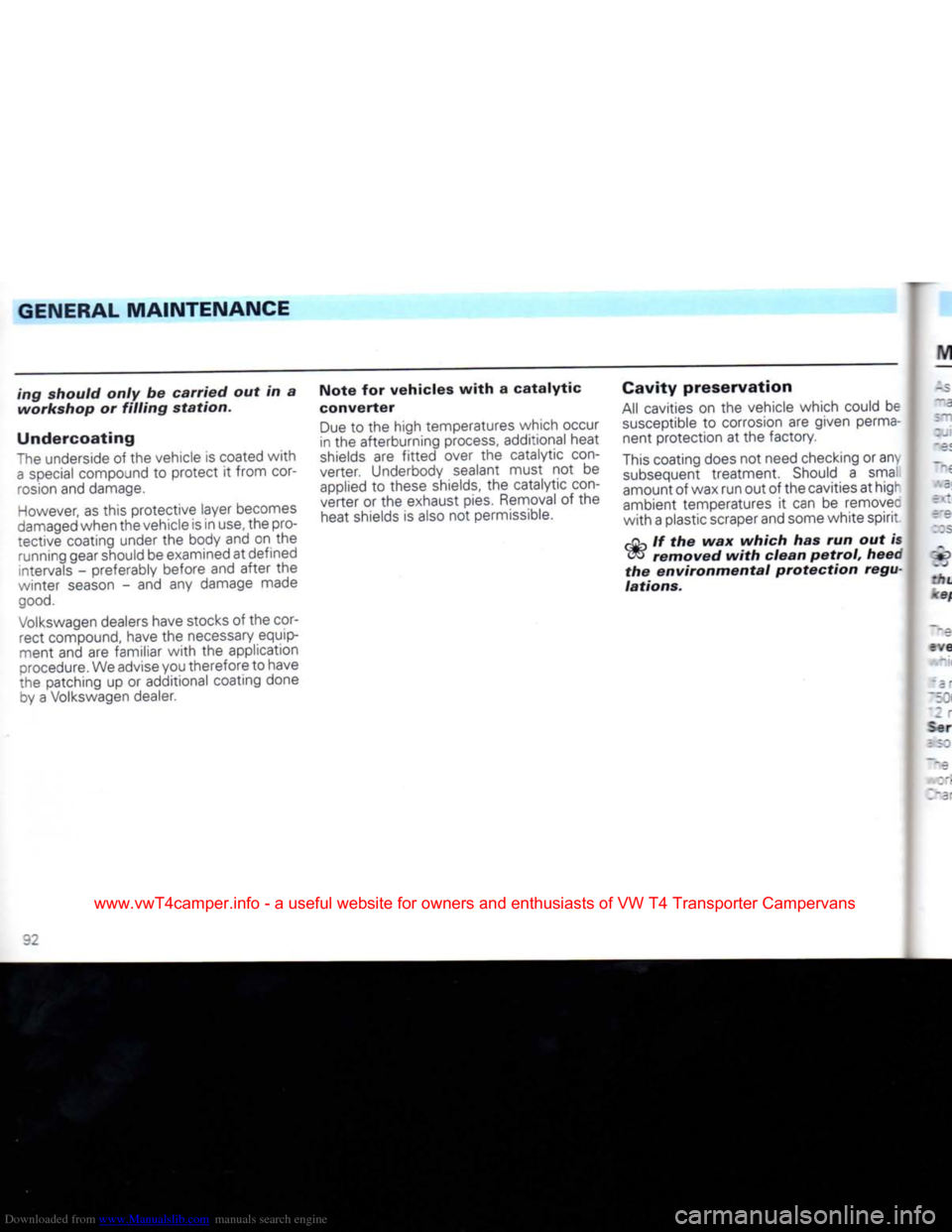
Downloaded from www.Manualslib.com manuals search engine
GENERAL MAINTENANCE
ing should only
be
carried
out in a
workshop
or
filling
station.
Undercoating
The underside
of
the vehicle
is
coated with
a special compound
to
protect
it
from cor rosion and damage.
However,
as
this protective layer becomes
damagedwhen the vehicle is in use, the pro
tective coating under
the
body and
on the
running gear should be examined at defined
intervals
-
preferably before
and
after
the
winter season
- and any
damage made
good.
Volkswagen dealers have stocks
of
the cor rect compound, have
the
necessary equip
ment and
are
familiar with
the
application
procedure. We advise you therefore to have
the patching
up or
additional coating done by
a
Volkswagen dealer.
Note
for
vehicles
with
a
catalytic
converter
Due
to
the high temperatures which occur
in the afterburning process, additional heat
shields
are
fitted over
the
catalytic
con
verter. Underbody sealant must
not be
applied
to
these shields,
the
catalytic
con
verter
or
the exhaust pies. Removal
of the
heat shields
is
also
not
permissible.
Cavity preservation
All cavities
on the
vehicle which could
be
susceptible
to
corrosion
are
given perma
nent protection
at
the factory.
This coating does not need checking or any subsequent treatment. Should
a
smal
amount of wax run out of the cavities at high
ambient temperatures
it can be
removec
with a plastic scraper and some white spirit
QCK
If the wax
which
has run out is
<35 removed with clean
petrol,
heed
the environmental protection
regu
lations.
www.vwT4camper.info - a useful website for owners and enthusiasts of VW T4 Transporter Campervans
Page 95 of 164

Downloaded from www.Manualslib.com manuals search engine
GENERAL
MAINTENANCE
Maintenance
-s
the
vehicle
is
fitted
with
modern
low
~aintenance
technical components only
small
amount
of
regular servicing
is re
tired
in
order
to
maintain
the
roadworthi-
"sss,
economy and reliability.
~ne Inspection Service offered by the Vol ks-
I
agen dealers takes into account
to a
large
extent
the
individual annual mileage
cov-
e-ed and helps thus
to
keep
the
operating
:osts
as
low as possible.
Regular maintenance helps to
-J
ensure
that
the emissions - and
thus the environmental burden are
kept
as low as possible.
The
Inspection
Service
is
required
every
12
months
or
every
30 000 km,
. nichever occurs
first.
I
a mileage
of
15 000
km
(petrol engines)
or
"500
km
(Diesel engines)
is
reached before "2 months
has
elapsed,
the Oil
change
Service must
be
carried out. See page
98
5
so and
the
Service Schedule.
~ie Service Schedule also shows what »rk
is
done
at the
Inspection
and Oil
Inange
Services.
In
arduous
operating
conditions, e.g.
extremely low ambient temperatures, very
dusty conditions etc. certain service oper
ations should be carried
out
between the in
tervals specified.
This
applies
in
particular
to:
• Changing
the
engine
oil
• Cleaning
or
changing
the air
cleaner
el
ement
• Draining water from
or
renewing the fuel
filter
on the
Diesel engine
The
service operations should be carried out by
a
Volkswagen dealer because this work
requires specialist knowledge, workshop
equipment and special tools. Furthermore
this work must
be
done
in
accordance
with
out instructions.
Complete
proof
of
servicing
by a
Volks
wagen dealer can be one
of
the stipulations
for
the
upholding
of any
warranty claims during
the
one year warranty period.
Attention
Safety
regulations
place
very
strict
limits
on the
amount
of re
pairs
and
adjustments
to
engine
and
running
gear
parts
which
can
be
done
by the
owner.
By
tinker
ing
with
parts
which affect
the
safety
of a
motor
vehicle
one can
endanger
oneself
and
other road users.
Altering the engine settings is detrimental to the
exhaust
emissions.
This means
that
the envi
ronment is burdened unnecessarily
and the
fuel
consumption
also
in
creases.
The disposal of old oil, used brake
fluid,
dirty
coolant, defective
bat
teries or worn-out tyres etc. must be
done according to environmental
protection regulations. It is even
better
if old operating fluids and parts are used
again
and
do not become a burden on the envi
ronment. Through "recycling" valu
able
raw-materials and
energy
are
saved and at the same
time
it re lieves the load on the toxic waste
dumps.
Volkswagen dealers collect
all reusable materials and parts and
passes
them
on to the correct
agency
for recycling.
www.vwT4camper.info - a useful website for owners and enthusiasts of VW T4 Transporter Campervans
Page 97 of 164

Downloaded from www.Manualslib.com manuals search engine
GENERAL
MAINTENANCE
Engine
compartment
Page
Windscreen
washer
container
.. 108
Power
assisted
steering
fluid
reservoir*
100
Engine
oil filler
opening
97
Engine
oil
dipstick
97
Coolant
expansion
tank 102
Brake
fluid
reservoir
104
Battery
106 Attention
Particular care should be
taken
when working in the engine
com
partment!
•
Switch off engine, remove ignition key.
•
Pull handbrake on firmly.
•
Move gear lever into neutral or
"P"
position.
•
Allow engine to cool off.
•
As long as the engine is at op
erating temperature:
-
Do not put your hand into the radiator fan, it could switch on
suddenly.
-
Do not open the radiator cap be
cause
the cooling system is
under
pressure.
•
Avoid causing short circuits in
the electrical system - particular ly at the
battery
-.
•
If tests have to be
carried
out
with
the engine running,
there
is
an additional danger
present
from rotating parts - e.g.
V-belts,
generator, radiator fan etc. - and
from the high voltage ignition
system.
Attention must be paid to the warnings given in this Instruc
tion Manual and to the generally
applicable
safety regulations.
When topping up fluids one
should
ensure
that
they are not mistaken,
one
for the other, under any
circum
stances,
otherwise serious
func
tional defects
will
result.
So
that
leaks
are quickly de
tected
the ground underneath
the vehicle should be checked
reg
ularly.
If spots as caused by oil or
other
operating fluids can be seen, the vehicle should be
taken
to the
workshop for checking.
www.vwT4camper.info - a useful website for owners and enthusiasts of VW T4 Transporter Campervans